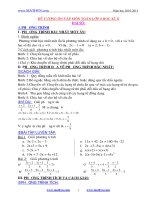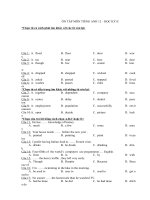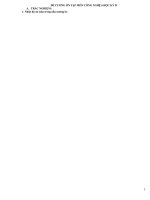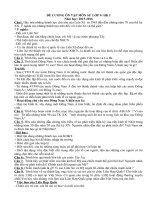ĐỀ CƯƠNG ÔN TẬP MÔN TIẾNG ANH 9 HỌC KỲ II
Bạn đang xem bản rút gọn của tài liệu. Xem và tải ngay bản đầy đủ của tài liệu tại đây (220.73 KB, 7 trang )
Đề cương ôn thi hk 2 khối 9 ( 2015+2016)
Unit 6: THE ENVIRONMENT
I. Adjectives and Adverbs (Tính từ và Trạng Từ)
a. Adjective:
VỊ TRÍ CỦA TÍNH TỪ:
- Tính từ đứng trước một danh từ để bổ nghĩa cho danh từ đó.
Ex: It is a white shirt.
- Tính từ theo sau một số động từ như:
to be, seem, keep, look, feel, taste, sound, smell, get, become …
b. Adverb:
CÁCH THÀNH LẬP TRẠNG TỪ CHỈ THỂ CÁCH:
Tính từ + ly Trạng từ
Một số trường hợp ngoại lệ:
good well
early early
late late
hard hard
fast fast
Ex: He is a good student. He studies well.
Trạng từ có chức năng bổ nghĩa cho động từ thường.
II. ADVERB CLAUSES OF REASON: Các mệnh đề trạng ngữ chỉ lý do
Mệnh đề trạng ngữ chỉ lý do bắt đầu bằng: Because / Since / As nói lên lý do của sự việc
được thể hiện
qua mệnh đề chính.
Ex: Ba is tired because / since / as he stayed up late watching TV.
III. ADJECTIVE + THAT CLAUSE
Trong đó “that-clause” bổ sung nghĩa cho adjective; mang nghĩa “rằng, là, mà”.
S + to be + Adjective + That + S + V
Ex: That’s wonderful. I am pleased that you are working hard.
adj. that-clause
IV. CONDITIONAL SENTENCES TYPE 1 (Câu điều kiện loại 1)
Nói đến một khả năng có thể xảy ra, thành hiện thực trong tương lai.
Câu điều kiện thông thường có 2 phần:
- Phần nêu lên điều kiện bắt đầu với IF ta gọi là mệnh đề chỉ điều kiện (If Clause). Nếu mệnh
đề if viết
trước thì phải có dấu phảy.
- Phần nêu lên kết quả gọi là mệnh đề chính. (Main Clause)
IF CLAUSE MAIN CLAUSE
Verb in Simple Present (Hiện Tại Đơn)
If - S – V (s/es)- O
Verb in Simple Future (Tương lai đơn)
S – will – V (bare infinitive) - O
BÀI TẬP THAM KHẢO
I. Put the verbs in brackets in the correct form (Conditional sentence Type 1):
1. If I find it, I (give)……………….you a call.
2. If you (like)……………, I can get you a job in this company.
3. If he pays me tonight, I (have)……………………………..enough money for the tickets.
1
4. If I (pass) …………the exam, I will go to the university next October.
5. If I tell the police the truth, I’m sure they (believe )……………………..you.
6. We (be)………………………able to walk across the river if the ice is thick enough.
7. If it (be)…………………fine tomorrow, we’ll go for a walk.
8. You can see my phone if yours (not work)…………………………………….
9. Unless I (hear)…………..the alarm, I won’t wake up.
10. if you put these glasses into very hot water, they (crack)
……………………………………………….
II.Combine these pairs of sentences. Use “Because/ Since/ As”.
1. The water is highly polluted. We can not swim in this part of the river.
…………………………………………………………………………………………………
…
2. It started to rain. We could not keep on the cleaning the beach.
………………………………………………………………………………………………….
3. We want people to be aware of the problem of pollution. We have “a green week” three
times a year.
…………………………………………………………………………………………………
……
4. Mr. Minh is admired. He dedicates all his life to protecting the environment.
…………………………………………………………………………………………………
……..
5. The area around the beach is full of trash. No one wants to go swimming or sunbathing
there.
…………………………………………………………………………………………………
……
6 . I have a broken leg. I fell over while I was playing basket ball.
.
…………………………………………………………………………………………………..
7. Hoa wants to go home. Hoa feels sick. ………………………………………………..
8. I broke the cup. I was careless. ……………………………………………………………..
9. Ba is tired. Ba stayed up late watching TV. …………………………………………………
10. I am hungry. I haven’t eaten all day.
…………………………………………………………
III.Combine each pair of sentences into one(adj +that clauses).
1) No one stopped those people cutting down the trees. I was surprised.
………………………………………………………………………………………..
2) The oil will pollute the sea. People are worried.
………………………………………………………………………………………………
3) My team has won the first award of the competition. I am proud.
………………………………………………………………………………………………….
4) They can help us to clean the beach. They are certain.
…………………………………………………………………………………………………
…
5) People can recover very quickly. I am very happy.
…………………………………………………………………………………………………
6) They didn’t tell us how to do it. I am disappointed.
…………………………………………………………………………………………………
2
7) I am working hard. My father is pleased.
…………………………………………………………………………………………………
UNIT 7: SAVING ENERGY
I. Connectives (các từ nối): and, but, because, or, so, therefore, however
Có chức năng nối các từ, các mệnh đề, các câu lại với nhau
Ex: I’d love to play volleyball but I have to complete an assignment.
II. Phrasal verbs (Các ngữ động từ)
turn off (tắt), turn on (mở, bật), look for (tìm, kiếm), look after (trông nom, chăm sóc), go on
(tiếp tục) ...
III. Making Suggestions (Đưa ra lời đề nghị)
1. SUGGEST + V-ING:
Ex: I suggest collecting some money.
2. SUGGEST + (that) + S + should +V:
Ex: I suggest (that) you should speak English in class.
BÀI TẬP THAM KHẢO
I. Use AND, SO , BUT, HOWEVER, OR, SO, THEREFORE to complete the sentences.
1. Polly’s watch was broken …………….. she borrowed mine.
2. My family went to Africa…………………..she wanted to study the wild animals.
3. Melissa tried to read the book. ……………………………… , she couldn’t understand it.
4. They went to town …………… bought a lot of things.
5. She isn’t English. ………………………… , she speaks English perfectly.
6. The air polluted……………………… there too much traffic.
7. Does she a teacher ……………………………… doctor?
8. I haven’t got a car…………………… I’ve got a motorbike.
9. They are pretty ……………………………….. intelligent.
10. Do you live in the city …………………….. in the country?
11. She was poor ……………………….. she was honest.
II.Rewite the sentences:
1. Why don’t you install a burglar alarm in your house?
- I suggest you
…………………………………………………………………………………..
2. Let’s put garbage bins around the school yard.
- I suggest………………………………………………………………………………..
3.Shall we go to the cinema tonight ?
What about.............................................................................................................?
4. I think it would be a good idea to take the train.
I suggest....................................................................................................................
III.Put the verbs in the brackets in the correct form:
1. The doctor suggested that his patient (stop)……………………smoking.
2. How about (dine)………………………..out tonight?
3. I suggest that you should (take)………………………a vacation.
4. She suggest that he (leave)…………………..now.
5. I suggested (help)……………………..our mother with the housework.
6. Why don’t we (go)………………….to the library now?
7. Let’s (do)………………………some reading every day.
8. We suggested his (see)…………………………..a doctor.
3
9. What about (ask)………………….our teacher for help.
10. I suggest we should (work)…………………harder.
UNIT 8: CELEBRATIONS
I. RELATIVE CLAUSES (Các mệnh đề quan hệ)
ADJECTIVE CLAUSE - Mệnh đề tính ngữ hay RELATIVE PRONOUNS - Đại từ
quan hệ
CÁCH DÙNG CÁC RELATIVE PRONOUNS
SUBJECT OBJECT POSSESSION
(Chủ từ) (Túc từ) (Sở hữu)
FOR PERSONS
(Người)
WHO WHOM WHOSE
THINGS,
ANIMALS
(Vật, con vật)
WHICH WHICH WHOSE
(OF WHICH)
1. WHO:
Thay thế cho danh từ hoặc cụm danh từ chỉ người và làm chủ từ trong câu phía sau:
2. WHOM:
Thay thế cho danh từ hoặc cụm từ chỉ cgười và làm túc từ trong câu phía sau:
3. WHICH:
Thay thế cho danh từ chỉ thú vật , sự việc, vật và làm chủ từ lẫn túc từ trong câu phía sau.
4. WHOSE:
Thay thế cho Tính Từ Sở Hữu. (MY, TOUR, HER, HIS, OUR, THEIR) mà đứng trước danh
từ chỉ người , vật, sự
việc
Whose luôn luôn đi kèm với 1 Danh Từ
• Chú ý: WHOSE VÀ OF WHICH:
Theo văn phạm cổ, thì WHOSE chỉ sự sở hữu dùng cho người còn OF WHICH thay cho thú
vật, vật, sự việc.
5. THAT
A. Nhìn chung ta có thể dùng THAT để thay thế cho WHO, WHOM, WHICH
B. Không được dùng THAT trong các trường hợp sau:
1. Sau 1 giới từ:
Ex: The dog is very big and angry . I gave a bone to it. The dog to which I gave a bone
is a very big and
angry.
Chú ý:Nếu muốn dùng "THAT" thì ta đem giới từ ra phía sau
2. Trong mệnh đề không giới hạn: NON-RESTRICTIVE CLAUSE
C. Bắt buộc dùng THAT:
Sau 1 tiền trí từ hỗn hợp : (người vật lẫn lộn)
4
(MIXED ANTECEDENT)
Ex: The old man and two dogs made much noise . They passed my house yesterday.
The old man and two dogs that I passed my house yesterday made much noise.
Sau 1 tính từ cực cấp (so sánh bậc nhất = SUPERLATIVE)
Trong câu thường có THE BEST và THE MOST.
-Sau các từ sau:
ALL, EVERY, VERY, ONLY, FIRST, LAST, MUCH, LITTLE, SOME, ANY, NO …
RESTRICTIVE CLAUSE = DEFINING CLAUSE (Mệnh đề giới hạn)
Một mệnh đề tính ngữ gọi là giới hạn khi nào nó cần thiết cho ý nghóa của cả câu. . Nếu bỏ
nó đi thì câu sẽ
không đầy đủ ý nghóa.
Chú ý trong trường hợp này giữa mệnh đề chính và mệnh đề tính ngữ không có dấu phẩy (,)
NON-RESTRICTIVE CLAUSE = NON - DEFINING CLAUSE (Mệnh đề không giới hạn)
Mệnh đề tínhngữ không giới hạn là mệnh đề không cần thiết cho câu . Nếu bỏ nó đi thì
mệnh đề chính vẫn còn
đủ ý nghóa . Nó chỉ thêm vào mệnh đề chính 1 ít chi tiết mà thôi.
Chú ý: Giữa mệnh đề chính và mệnh đề không giới hạn có dấu phẩy (,)
Chú ý: Thường ta dùng dấu phẩy (,) sau:
Danh từ riêng.
Tính từ sở hữu : my, your, his, her, our, their
Không dùng THAT trong mệnh đề không giới hạn.
@ NOTES:
I/ Combination:
- Tìm từ tương đồng ( câu I: tìm danh từ thường đứng trước động từ hoặc cuối câu, câu II
danht từ hoặc
các từ thuộc ngôi thứ 3 “he, she, it , they…”
- Viết câu I cho đến danh từ, thêm vào DTQH
- Viết từ đầu câu II, bỏ từ giống nhau trong câu II, viết tiếp câu I (nếu còn)
Ex: The man was friendly. He took me to the airport.
-> The man who took me to the airport was friendly.
Ex: You should get a dictionary. You can look up these difficult words in it.
-> You should get a dictionary which / that you can look up these difficult words in. ->
You should get
a dictionary to look up these difficult words in.
II/ Multiple choice
1/ Noun of person + Who + verb / Whom + S + Verb / Whose + Noun
2/ Noun of thing + Which + Verb / S + Verb
3/ Noun of place + Where + S + Verb ( Note of the use of which and where)
4/ Noun of time + When + S + Verb
5/ Noun of reason + Why + S + Verb
“That” = “who, whom, which” ( Nếu câu có dấu phẩy hoặc có giới từ không được
dùng “that”)
5
Prep + Which / whom
II. ADVERB CLAUSES OF CONCESSION
(Các mệnh đề trạng ngữ chỉ sự nhượng bộ)
1. although / even though / though + clause: mặc dù / cho dù ...
Ex: Although they were tired, they continued working.
2. in spite of / despite + noun / noun phrase:
Ex: In spite of / Despite heavy traffic, he arrived on time.
UNIT 9: NATURAL DISASTERS
Grammar: Relative pronouns (continued)
BÀI TẬP THAM KHẢO
I/ Fill in the blanks with relative pronouns (Who, Whom, Which)
1. The girls ________ are playing skip rope are my friends.
2. He finally married the girl ________ he loved.
3. The presents_______ my mother gave me are very beautiful.
4. Tet is a festival _______ occurs in late January or early February.
5. The men _________ you saw on TV were from China.
6. Is this the pen you ________lost?
7. The car _________ he has just bought is very expensive.
8. The book ________ he is reading is on Christmas' Eve.
9. Do you know the boy _________ the police are looking for?
10. The man ________ we met yesterday is a famous doctor.
11. The actor ________ Lan likes best is Lam Truong.
12. The dog ___________ is barking is Lan’s
13. The woman ___________ you met yesterday is my teacher.
14. The news ___________ makes me happy is from Tam.
15. These exercises ___________ the teacher asks you to do is difficult.
16. Our grandparents ___________ loved us so much died.
17. Christmas is a festival ___________ is on 24th December.
18.The girl. ……………. won the prize is happy.
19. The bicycle ………..is in my house is mine..
20.I am using a sentence. ………………………..contains an adjective clause.
II/ Combine each pair of sentences, using (Who, Whom, Which, Whose)
1.The letter is from London. Our sister is reading it.
2.She wears the uniform. It was made last week.
3.Nam gives me the tickets. He bought them yesterday.
4.The dog is the biggest one in this area. My brother is taking the dog.
5.Who is the woman? Our teacher is talking to that woman.
III/ Combine each pair of sentences, using WHO, WHOM, WHICH:
1. “Time” is a magazine. It is read in those countries.
2. Many readers have used this card-catalogue. It is very helpful in finding the titles of the
books.
3. This is the man. He gave me your notebooks this morning.
4. I’m sure this is the school girl. She told them to do it.
5. Bring me the dictionary. It is on the table.
6
6. He has some friends. I know them.
7. Nothing will help me. You can do it now.
8. The bee flew away quickly. The bee had stung you.
9. We don’t like the food very much. It has just taken form the refrigerator.
10. The dress belongs to my teacher. It has the beautiful picture.
IV/ Combine each pair of sentences, using WHERE or WHEN:
1. The house was built twenty years ago. We are living in the house.
2. That is the room. The meeting was held in that room.
3. He always remembers the day. We first met on that day.
4. She was born in Malaysia. Rubber trees grow well there.
5. No one knows the school. My uncle taught at that school five years ago.
6. Please ask them the time. The train started the trip at that time.
7. New year's day is the day. All family's members gather and enjoy a family dinner then.
8. We'll take you to Dalat. You can enjoy pure air there.
9. You can't enjoy hiking in winter. Snow covers everything in winter.
..............................................................................................................................
10. The field is very fertile. They plant potatoes in the field.
V. Use “ALTHOUGH” to combine each pair of these sentences.
1.He often tells lies. Many people believe him.
.............................................................................
2.She didn’t each much. She was hungry. .
.....................................................................................
3.He is over 60. He doesn’t wear glasses. .
.....................................................................................
4.It got dark. They continued to work. . .....................................................................................
5.She kept on studying. It was noisy. . .....................................................................................
6.He ate all the fruits. They were green. .
.....................................................................................
7.We could do the test. It was very
difficult. ..................................................................................
8.He is very strong. I’m not afraid of
him. ......................................................................................
9.The plane took off. The weather was bad.
....................................................................................
10He didn’t stop his car. The traffic lights turned red. . ...............................................
VI.Rewrite the sentences:
1. The joke was funny, but no one laughed.
Although...................................................................................................................
2. .Donna got the job, but she didn’t have the qualifications.
3.Although.......................................................................................................................
7









